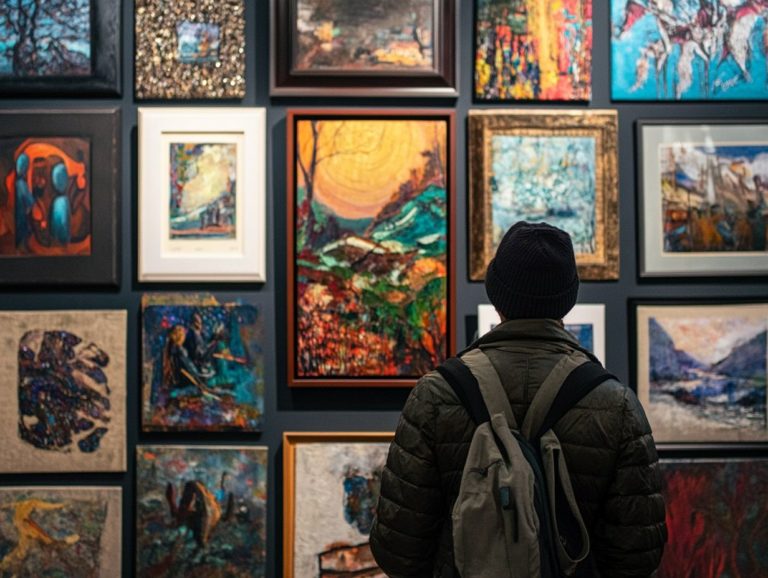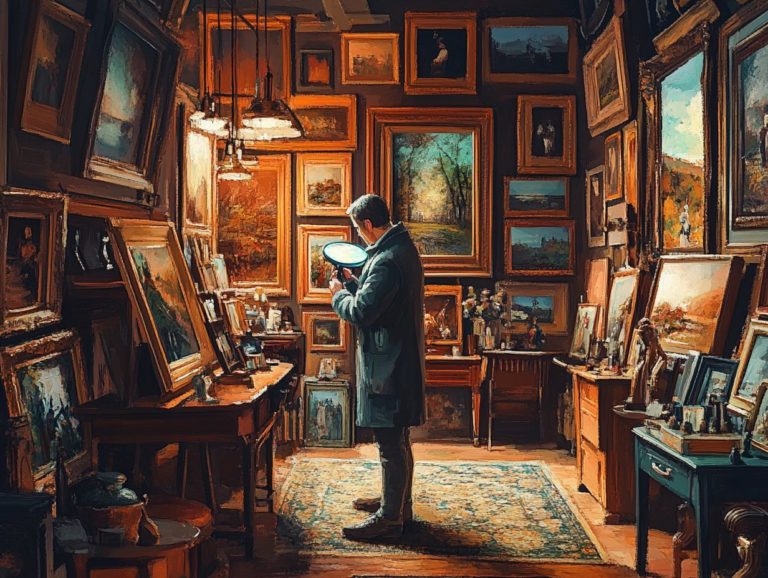The Psychology of Collecting: Why We Collect
Collecting transcends mere hobby; it taps into profound psychological motivations that shape your very identity.
From the excitement of finding new items to the satisfaction of showcasing a carefully curated collection, the reasons behind your collecting behavior are as diverse as the items you cherish. This exploration delves into the emotional and cognitive factors that drive you to collect, how your collections influence your identity, and the potential downsides of this passion.
You ll also find valuable tips for fostering healthy collecting habits. Get ready to explore the fascinating world of collecting and its impact on your life!
Contents
Key Takeaways:
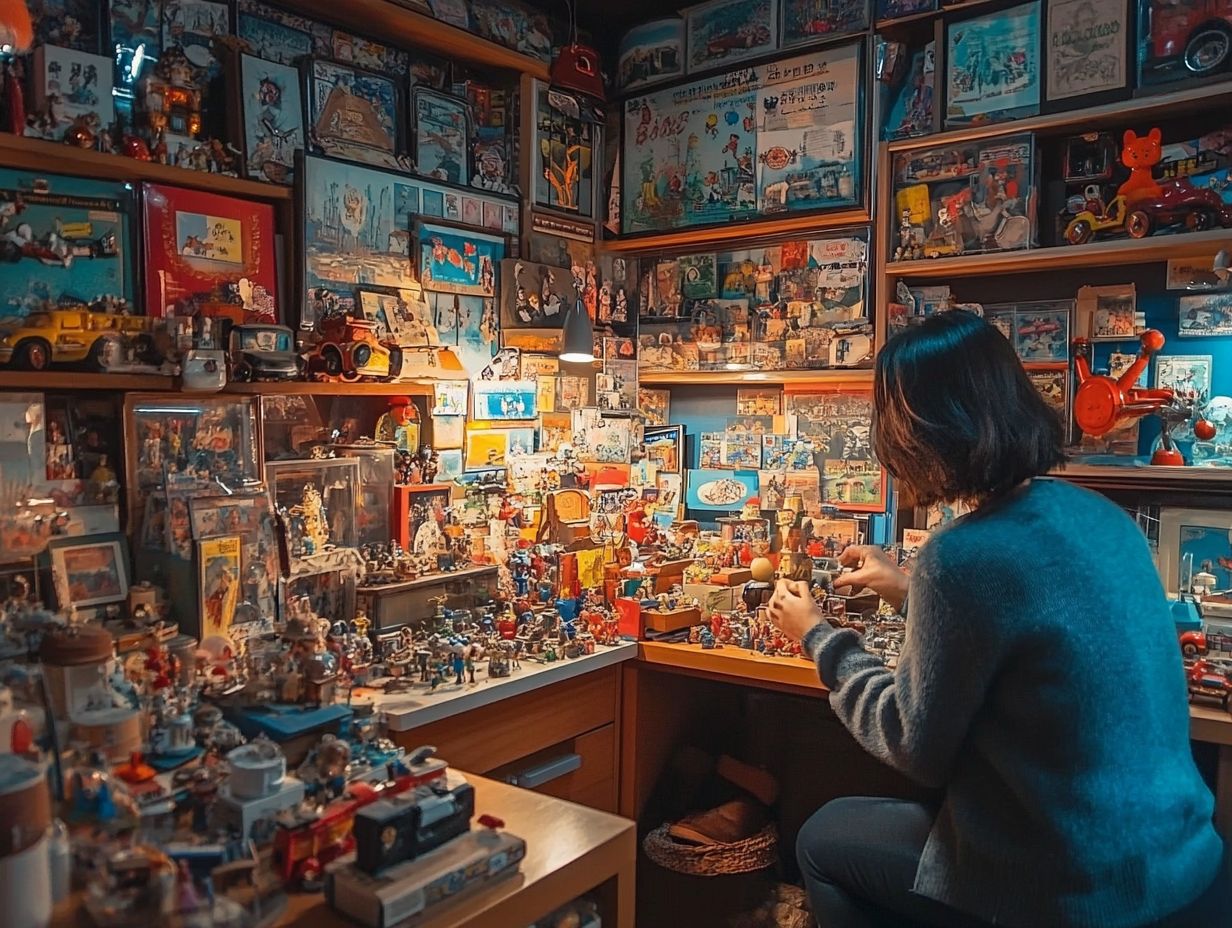
Collecting is a popular and fascinating hobby that stems from our innate desire to collect and organize objects that hold meaning and value to us. Our psychological motivations can be driven by emotional factors, such as nostalgia, a sense of control, and a need for order and completion. Collecting significantly impacts our identity, allowing us to express our interests and values, and can even shape our self-perception and social status.
The Fascination with Collecting
Your fascination with collecting goes beyond simple accumulation; it intertwines with the psychology behind it. This provides you with a powerful means to form emotional connections with unique objects that reflect your personal history.
Researchers found that collecting activates the brain’s pleasure center, triggering nostalgia from your childhood and nurturing a profound sense of legacy and cultural heritage that resonates deeply within you as a collector.
Understanding the Attraction
The allure of collecting often stems from social motivations and the thrilling chase as you seek out beautiful objects that resonate with your interests.
This pursuit helps you forge connections with like-minded enthusiasts and ignites excitement as you anticipate adding valuable items to your collection.
For example, as a die-hard comic book fan, you might relish the quest for rare editions, while antique lovers often share captivating stories about their discoveries at flea markets and estate sales.
These social interactions, paired with the joy of discovery, elevate your experience beyond simple acquisition, transforming collecting into a rewarding journey that fulfills your personal passions.
The sense of community enhances the value of each piece you collect, making your endeavors even more meaningful.
Psychological Motivations for Collecting
The psychological motivations for collecting can be quite diverse. They range from emotional attachment and intellectual satisfaction to challenges like keeping too many items that you can’t manage.
This spectrum reveals the intricate nature of the hobby, showcasing how it can encompass both deeply personal connections and complex behaviors.
Emotional and Cognitive Factors
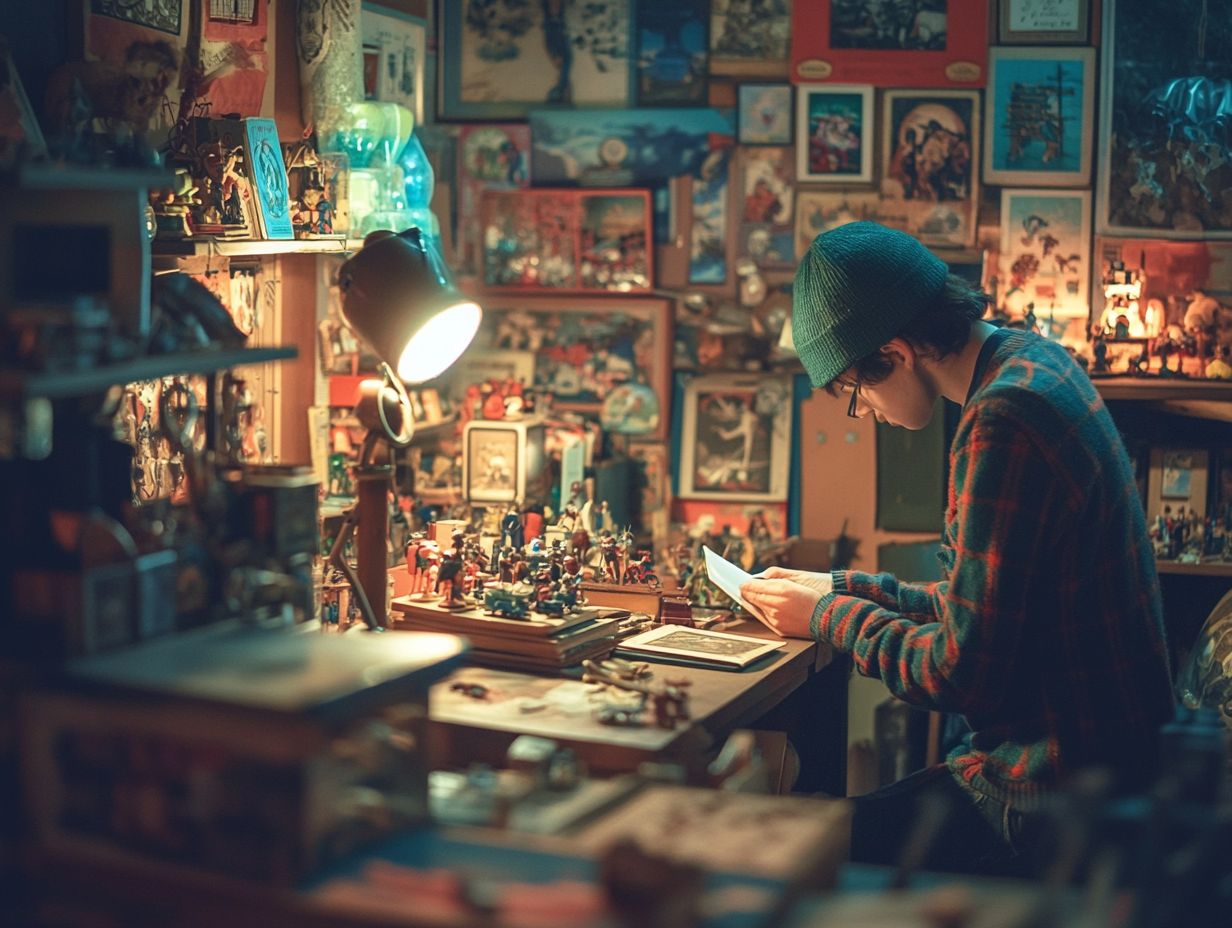
Emotional and cognitive factors significantly shape your collecting behavior, often leading you to form deep attachments to your collections. Nostalgia from childhood and the desire to build a legacy are powerful motivators guiding your journey.
These psychological dimensions influence the objects you choose, as each piece tends to evoke cherished memories or represents a meaningful chapter from your past. Nostalgia enhances the personal significance of the items and shapes your decisions, turning each acquisition into a storytelling artifact that adds depth to your narrative.
Your aesthetic appreciation amplifies the value of these items, elevating the act of collecting into a refined art form that demands a discerning eye. With academic knowledge at your disposal, you can identify unique and rare objects, thereby elevating your collection into realms of cultural significance and historical importance.
The Impact of Collecting on Identity
The impact of collecting on identity is truly profound. Engaging in collecting behavior shapes how you perceive yourself and cultivates a network of friends who share your interests.
This fosters a strong sense of belonging and connection to your cultural heritage, all through the personal items you cherish.
Start your collection journey today and discover the joy it brings!
How Collecting Shapes Self-Perception
Collecting shapes your self-perception by offering a canvas for you to express your passions and interests. This often leads to deep emotional connections with your collections, fostering social ties as you identify rare items that resonate with you.
This bond helps you see yourself beyond just owning things. You become a storyteller and curator of your own unique story.
As you revel in the joy of uncovering rare finds, you naturally share your journey with fellow enthusiasts. This weaves a vibrant tapestry of social interactions that enhances your sense of belonging.
These shared experiences amplify your enthusiasm and play a significant role in shaping your legacy. They influence how you are perceived within your communities and beyond.
Ultimately, the interplay between your collection and your individual identity transforms simple objects into enduring symbols of both personal and collective histories.
The Dark Side of Collecting
Collecting can be an incredibly fulfilling hobby, yet it has a darker side that you should be aware of. It can manifest as compulsive hoarding, potentially evolving into a mental disorder that profoundly affects your behavior and alters your perception of financial investment in valuable items.
Navigating the fine line between passion and excess is crucial.
Potential Negative Effects
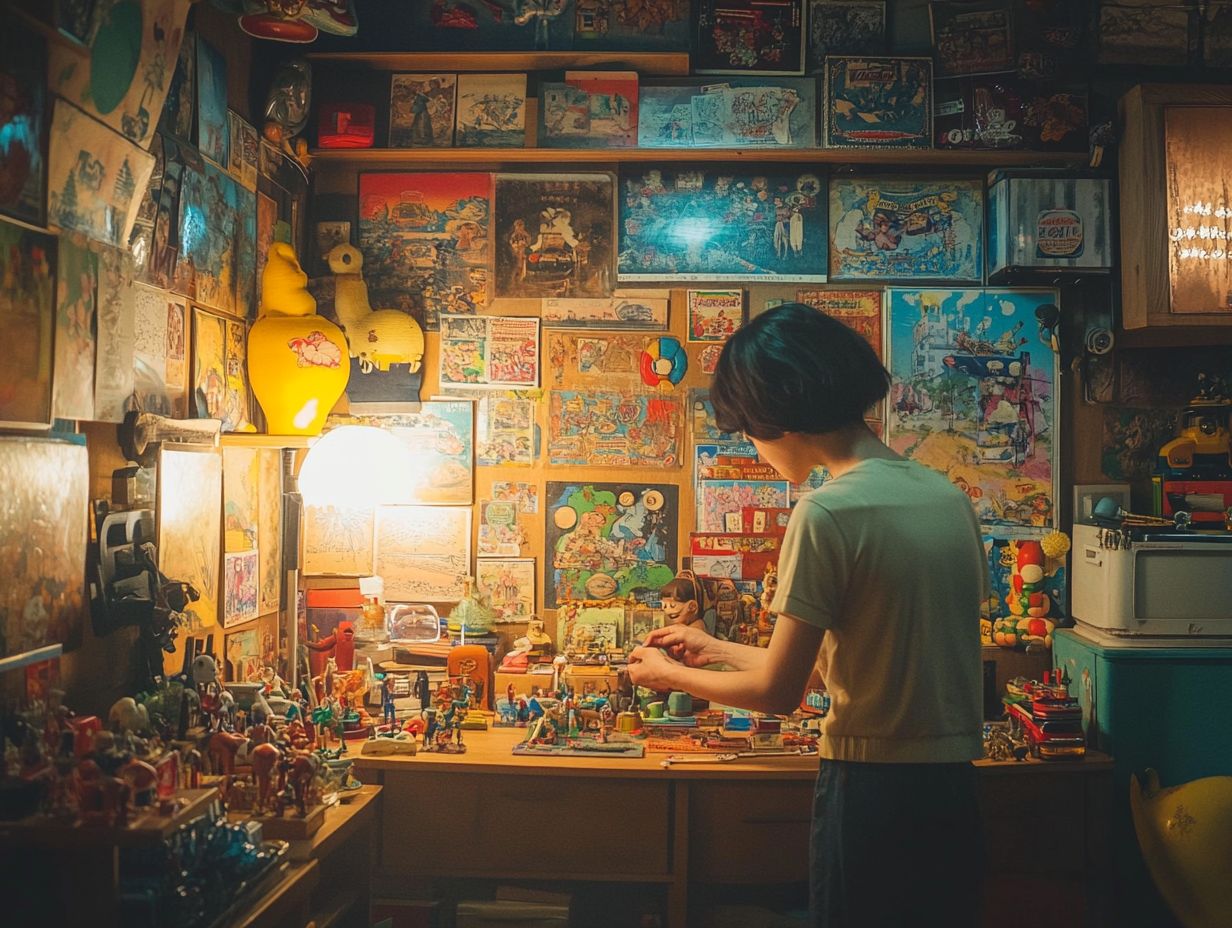
Collecting can have its downsides. You might face social disconnection and financial strain, especially if your collecting habits veer into compulsive hoarding. This shift can affect not just your well-being but also your personal relationships.
Unhealthy collecting behaviors can lead to isolation from friends and family. The allure of your collection may overshadow meaningful connections.
The financial burden of endless acquisitions can threaten your stability. It can potentially lead to debt and stress that permeate your personal and professional life.
Regularly evaluate your habits to stay in control! Stay alert to warning signs like neglecting responsibilities or experiencing an overpowering urge to acquire more items.
Striking a balance between passion and obsession is essential. This enables you to relish your hobby while keeping it from spiraling out of control.
Managing and Understanding Collecting Behaviors
Managing and understanding collecting behaviors requires you to cultivate healthy collecting habits that seamlessly integrate research and cataloging techniques.
By honing your organizational skills, you can transform collecting into a fulfilling pursuit rather than merely a burdensome financial investment.
Embrace this journey! Watch your collection flourish into something truly rewarding.
Tips for Healthy Collecting Habits
Developing healthy collecting habits can significantly elevate your experience. It enhances your organizational skills and allows you to delve into research and cataloging.
This process becomes a therapeutic form of collecting while also aiding in the meaningful construction of your legacy. To cultivate a well-rounded approach, it s essential for you to implement effective organizational strategies.
Maintaining a digital inventory and designating specific storage spaces for different items minimizes clutter and heightens the joy of rediscovery. Engaging in thorough research about your subjects of interest can deepen your understanding and appreciation of the items.
Ultimately, finding a balance between passion and practicality ensures that collecting fulfills your personal needs while promoting emotional well-being. This balance allows you to reflect on your journey in a truly meaningful way.
Frequently Asked Questions
What is the psychology behind collecting?
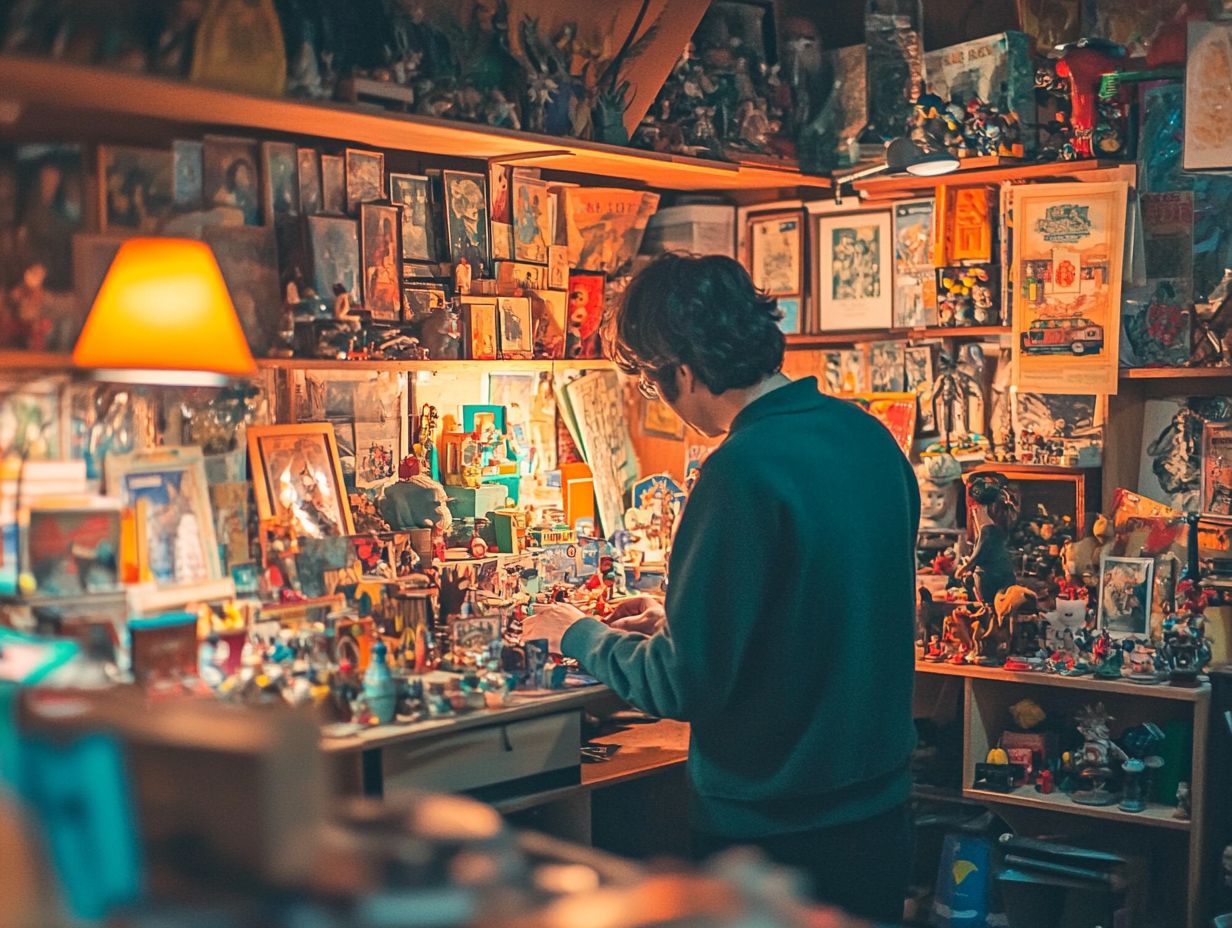
The psychology of collecting is the study of why individuals collect and the underlying motivations, behaviors, and emotions that drive this behavior.
Why do people collect?
People collect for a variety of reasons, including personal enjoyment, nostalgia, social status, and investment purposes. It can also be a means of self-expression and a way to connect with others who share similar interests.
Start today and make your collection a source of joy!
Is collecting considered a form of hoarding?
No, collecting is not hoarding. Hoarding involves excessive accumulation of items, causing clutter and daily struggles. Collecting is purposeful and organized.
What are some common types of collections?
Common collections include stamps, coins, vintage items, sports memorabilia, art, books, and antiques. They can also include everyday objects or rare treasures!
How does collecting impact our mental health?
Collecting can boost our mental health by providing purpose and enjoyment. However, collecting too much can lead to financial issues and isolation.
Can collecting become a problem?
Collecting can become problematic if it starts to harm your life. This includes overspending or having trouble letting go of items. If you find this happening, seeking help can be beneficial.





